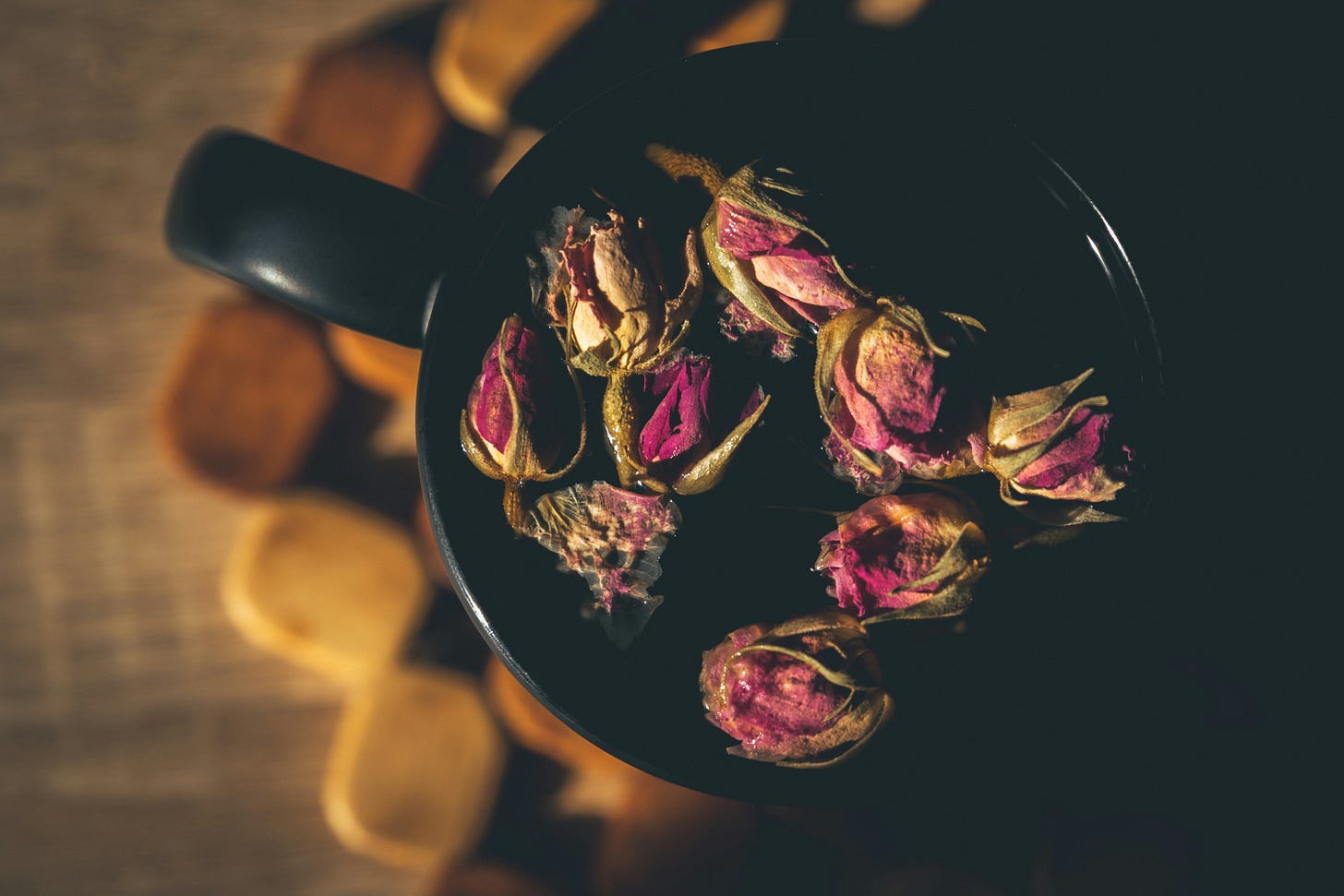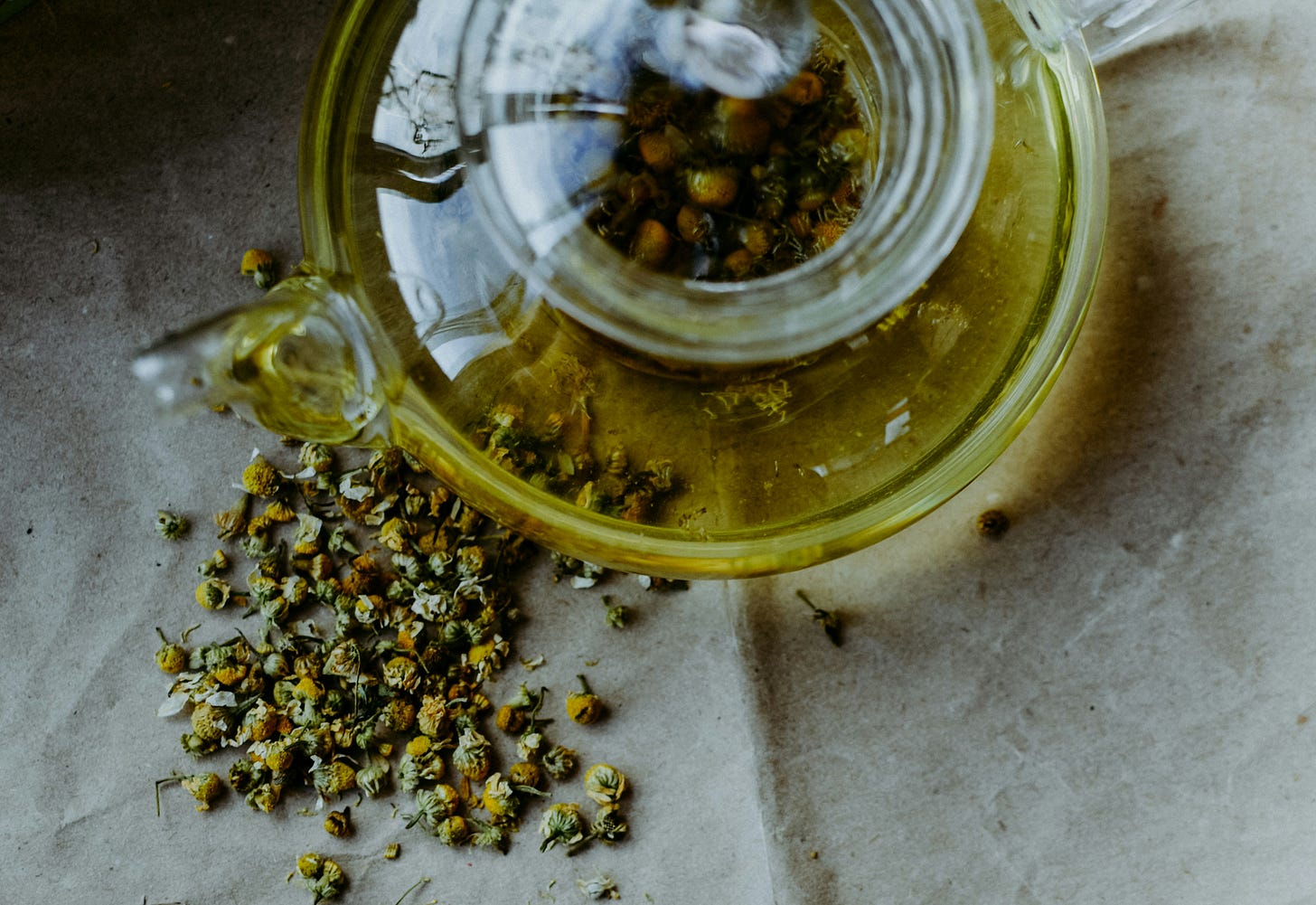Three Sips of Floral Teas
Enter the enchanting world of rose, lavender, and chamomile teas
This article is part of the Dish-Covery series, where we uncover the stories behind your beloved flavors. Pulling back the curtain to look at culinary traditions that shape our modern palates.
After years of being a staunch (ok, snobby) Earl Grey tea drinker, I surprised myself by falling heads over heels in love after drinking Rose Congou tea at Fairmont Empress Hotel in Victoria, BC.
In contrast to Earl Grey’s masculine aroma, the delicate rose tea brought forth a sweet feeling of euphoria, not unlike the sensation of feeling the flush of attraction and romance. I swear that I blushed with my first sip.
In the catalog of tea blends enjoyed across the planet, three florals reign supreme - rose, lavender, and chamomile.

Romantic Rose
Rose tea stands out among floral varieties, exuding romance, sensuality, and sophistication with its delicate fragrance and subtle sweetness. Enchanting tea lovers for centuries, it captivates hearts with its timeless allure and profound symbolic significance.
Throughout history, rose petals have symbolized love, beauty, and passion, scattered in baths and infused in potions as ancient aphrodisiacs. The tradition of steeping rose petals in water to create tea traces back to ancient Persia, where it epitomized luxury and indulgence.
Rose tea's influence extends globally, with variations found in cultures worldwide. In the Middle East, rose water and tea are integral to culinary and cultural traditions, gracing desserts, beverages, and ceremonial occasions.
In recent times, rose tea has experienced a resurgence in popularity, celebrated for its delicate flavor profile and potential health benefits. Abundant in antioxidants and vitamins, rose tea is esteemed for promoting skin health, aiding digestion, and reducing stress. It has become a cherished component of wellness routines for its soothing effects and aromatic allure.

Lovely Lavender
Lavender tea, with its soothing scent and calming properties, offers a journey through the tranquil landscapes of Provence and beyond. One of the most popular floral flavors for tea and coffee, lavender has a rich history steeped in tradition and is revered for its therapeutic benefits.
Lavender's fragrant blossoms have long been cherished for their aromatic properties, used in sachets, potpourri, and essential oils to create a sense of relaxation and serenity. In tea form, lavender's delicate flavor profile is both refreshing and comforting, evoking images of sun-drenched fields and gentle breezes.
Lavender tea isn't just for sipping; it's also a versatile ingredient in culinary creations. From lavender-infused desserts like cakes and cookies to savory dishes such as lavender-infused sauces and marinades, this floral herb adds a unique twist to any recipe. Its subtle floral notes complement a wide range of flavors, making it a favorite among chefs and home cooks alike.
Besides its pungent aroma, lavender is cherished for its potential health benefits, including its ability to promote relaxation, reduce anxiety, and improve sleep quality. Whether enjoyed as a calming bedtime beverage or as a soothing remedy for stress, lavender tea offers a natural and holistic approach to wellness.

Cozy Chamomile
Chamomile tea, often called "nature's tranquilizer," has been cherished for centuries for its calming and soothing properties. With its gentle flavor and medicinal benefits, chamomile has become a beloved staple in tea cabinets worldwide.
Use of chamomile dates back to ancient Egypt, where it was revered for its medicinal properties and offered as a tribute to the gods. In ancient Greece and Rome, chamomile was used to treat various ailments, including insomnia, digestive issues, and anxiety. Its name, derived from the Greek words "chamai" (ground) and "melos" (apple), reflects its pleasant, apple-like aroma.
Chamomile tea is prized for its ability to promote relaxation and ease stress. Its gentle sedative properties make it an ideal bedtime beverage, helping to calm the mind and prepare the body for restful sleep. Whether hot or cold, chamomile tea offers tranquility in a busy world, allowing tea drinkers to unwind and recharge.
Chamomile is soothing to the soul and beneficial for overall health and well-being. Rich in antioxidants and anti-inflammatory compounds, chamomile tea may help support immune function, improve digestion, and reduce inflammation. It's a natural remedy that has stood the test of time, offering comfort and relief to generations of tea lovers.
Pro-Tip: Don’t toss those used chamomile tea bags!
In the summertime, keep some in the fridge for a quick pick-me-up for tired eyes!
Let’s Stay Connected
Follow us on Instagram @asweeat,
Join our Family Recipes, Traditions, and Food Lore community on Facebook
Subscribe to the As We Eat Journal
Listen to the As We Eat Podcast
Do you have a great idea 💡 for a show topic, a recipe 🥘 that you want to share, or just say “hi”👋🏻? Send us an email at connect@asweeat.com
We love creating for the As We Eat community in hopes that those creations educate, enlighten, and entertain you. We also both understand that there are requests for monetary patronage from nearly every quarter, and we don’t want you to have to pick and choose which creative endeavors you support, so we’d like to propose a new patron option to “tip” according to the value that AS WE EAT brings to you.
Whether it’s a one time gift or a monthly or yearly subscription, we appreciate your support of our work













A friend of mine owns a B&B surrounded by lavender, when you arrive she serves lavender tea, lavender shortbread and lavender ice cream. It's a heavenly start to the relaxing weekend and she has just the right touch and never goes overboard on the amount of lavender in each!
I drink nettle tea every morning - it’s a potent anti-histamine! So not very floral, but more grassy (and grass is floral-adjacent, right?) 🫖